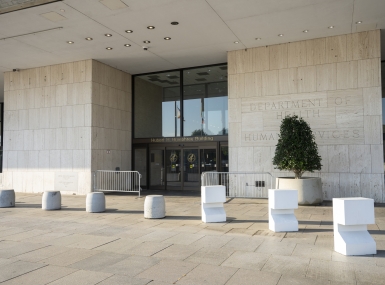Pima County, Ariz. invests in preschool for 1,600 kids

Key Takeaways
Quality early childhood education contributes to better outcomes in social development, health and employment, according to experts, but it comes at a price. The Pima County, Ariz. Board of Supervisors is investing in the future of its community, providing access to high-quality early education for children in families who can’t afford the $800 a month on average it costs to send a child to preschool in the county.
The Pima Early Education Program Scholarships (PEEPS) program functions through a mixed-delivery system, offering free school district preschool classes, Quality First scholarships and extended-day Head Start programming for low-income and middle-class residents in the county. Offering multiple early education options through the program is the best way to cater to the diverse needs of families across Pima County, according to Nicole Scott, who manages the PEEPS program.
For the 2023-2024 school year, PEEPS is serving more than 1,600 children, one of whom is the 3-year-old son of Mandy Stoffle. Cam, who is attending preschool through the Flowing Wells school district, has learned the alphabet, can write out his name and has made strides in counting and reading since he’s been enrolled in the PEEPS program.
Stoffle’s oldest child didn’t attend preschool, because the cost was out of reach for the family, and instead went to a home daycare. Stoffle said the quality of education through PEEPS has “exceeded her expectations” and made Cam “extra prepared” for kindergarten.
“I think most people are like, ‘Oh, my kid doesn’t need preschool, a babysitter’s fine,’ but let me tell you, it makes a difference,” Stoffle said. “It’s such a critical time when their minds are like little sponges, and they just soak it all up.”
Research shows that 90% of a child’s brain develops in their first five years; high-quality early education increases executive functioning skills and self-development, Scott noted.
“When children are in a high-quality environment where they’re able to explore and imagine and be inventive, self-confidence builds,” Scott said. “… They’re going to be more successful in life with problem-solving, with testing, with opening up to friends and being parts of groups and teams.”
Stoffle said the socialization preschool fosters has been “exceptional” for Cam, who was born during the COVID-19 pandemic.
“My son was what we call a ‘COVID baby,’ so we were stuck in the house for two years after,” she said. “So, the fact that he’s had this opportunity to start socializing and make new friends has just been such a huge benefit as well … And it’s nice to have that flow of having the option of keeping them in the same school district.”
Quality early education benefits not only children, but the broader community, Scott noted.
Affordable high-quality preschool and childcare is “essential to parents’ abilities to balance work success with family responsibilities,” according to a 2013 report published by the Center for American Progress.
“We’ve got parents in the workforce, parents furthering their education, so now our community as a whole is healthier,” Scott said. “It’s a giant circle. When we invest in these young learners, to me, it’s really an infrastructure thing.”
Investing in high quality early education is “absolutely crucial,” said Pima County Supervisor Rex Scott. Scott’s wife, who taught kindergarten, told him on numerous occasions that she could tell on the first day of the school year which of her kids had had the benefit of going to preschool, he said.
Scott, who worked in Arizona schools for nearly 30 years himself, said PEEPS is “the most important expenditure in the county’s budget.”
“And I don’t think it’s hyperbolic to say that,” he said. “Because when you invest in one child, what that means to that child and their parents, it’s difficult to put a price tag on that. And when you’re investing in 1,600 kids … then you’re really investing in the potential and future of our community.”
The Pima County Board of Supervisors has allocated $30.2 million in American Rescue Plan Act dollars to fund the program. Participating school districts, the city of Tucson and the towns of Marana and Oro Valley also contribute to funding, and donations can be sent by non-profits, businesses or individuals through the United Way of Tucson and Southern Arizona.
After the ARPA funds expire, the county’s contribution to the program will continue through a portion of the secondary property tax that funds the library district, which is allowed through a state law created in 2021. While Pima County is the only county in Arizona to have a preschool program of this kind, any county in the state could implement it as well, through the law.
Supervisor Scott attributed the bill passing to its backing from the Southern Arizona Leadership Council, a business association, many of whose members are also involved in the Preschool Promise, a coalition of educators, business leaders, community organizations and parents working to make preschool accessible to all children in Arizona.
“If you’ve got a vibrant pre-K to higher-ed system of schooling, then businesses are more likely to stay here and more likely to want to come here,” Scott said. “That way, the legislators knew that it wasn’t just something that was of interest to Pima County, it really was of interest to the private sector overall.”
A report by the nonprofit ReadyNation found that Arizona’s lack of accessible childcare has resulted in an annual economic cost of $4.7 billion in lost earnings, productivity and revenue.
The county couldn’t wait for the state to step in and support its youth in early education, according to Pima County Chair Adelita Grijalva.
Grijalva attended the Tucson Unified School District and served on the school district’s Governing Board for 20 years; when she was elected to the Pima County Board of Supervisors in 2020, she knew that quality education needed to be a county priority.
“I said, ‘Why are we not investing in early childhood education?’” Grijalva said. “And another one of my colleagues said, ‘Well that’s not what Pima County does.’
“Well, Pima County is in charge of the jail, indigent care, workforce development — many of the programs that we have, are to help people because they don’t have the education, they weren’t successful in other programs, so if we help young people get a stronger start from very early childhood, then they’re less likely to need these programs, statistically, so in the long run, this investment is going to reap dividends.”
PEEPS has expanded significantly since it was created in 2021, serving nearly double the number of children this school year than the 856 children it did in its first.
The number of classes has grown as well (from 11 to 30), and the income eligibility has changed to make the program available to more people “in the middle.” The program was initially available to families making up to 200% of the federal poverty level, and has since expanded to 300%, or a household annual income of $90,000 for a family of 4.
Grijalva said the program’s updated income eligibility creates access for people who don’t meet the criteria for low-income programming, but can’t afford to send their children to preschool out of pocket.
Grijalva, a mother of three, sent her children to preschool, but said it was a “huge sacrifice financially” for her family.
Preschool shouldn’t be “the thing that falls off of the list first” when other expenses come up, she said.
“We’re opening the opportunity up to a lot more families,” Grijalva said. “And I just hope we can continue to do more of that.”
Related News

U.S. Department of Health and Human Services announces major restructuring
On March 27, the U.S. Department of Health and Human Services (HHS) announced a sweeping reorganization that will consolidate agencies, shift key programs under a new framework and eliminate thousands of positions. This change brings HHS in line with President Trump's Executive Order, “Implementing the President’s ‘Department of Government Efficiency’ Workforce Optimization Initiative.”

U.S. Department of Health and Human Services moves to reduce public comment in rulemaking
On February 28, the U.S. Department of Health and Human Services (HHS) announced a policy change limiting public comment opportunities to only those required by law. Published in the Federal Register on March 3, the decision rescinds the “Richardson Waiver,” a 1971 directive from then-HHS Secretary Elliot Richardson that encouraged broader public input on regulations related to public benefits, grants and healthcare policies.

U.S. Congress begins work on budget reconciliation process: What this means for counties
The House and Senate Budget Committees have marked up Fiscal Year (FY) 2025 budget resolutions to initiate the budget reconciliation process to enact policy priorities without garnering bipartisan support, although the two chambers differ in their approach to drafting the legislation.
County News
Library Story Times Teach Preschoolers STEM

